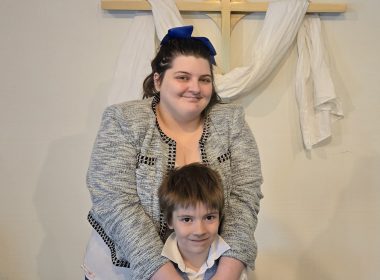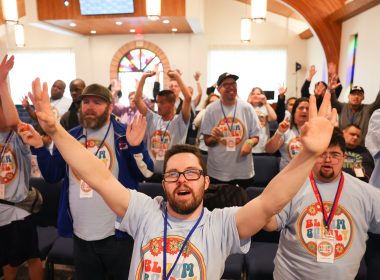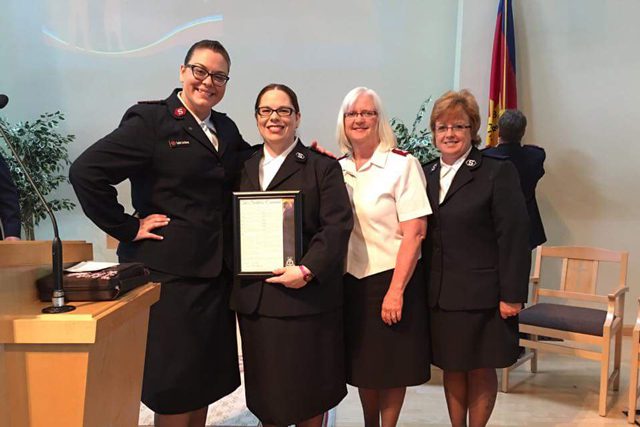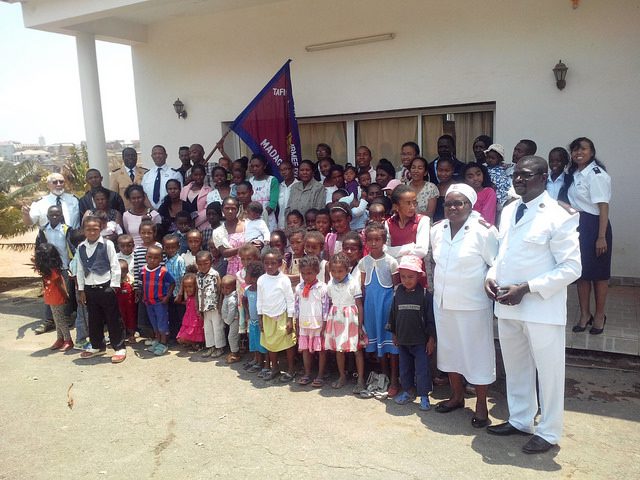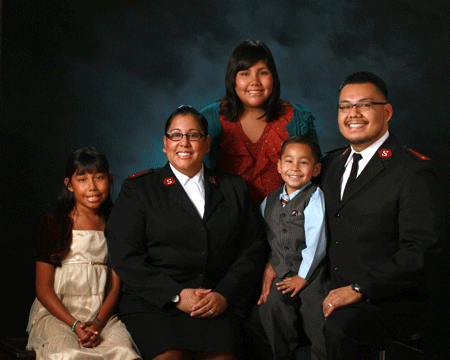The Salvation Army Housing First program in Denver helps homeless families and senior citizens.
By Caramie Petrowsky –
 Charrie Burres told her grandsons the truth when they asked why they kept moving from place to place.
Charrie Burres told her grandsons the truth when they asked why they kept moving from place to place.
“I let them know that because I couldn’t find a job, that we would have to go and stay at a shelter,” she said. “And each time we moved, I let them know it was a step closer to us being able to get something more permanent.”
She credits that honesty and hopefulness, plus keeping the boys’ routines intact, with helping them survive while they were homeless for 14 months. Each night the boys, Ja’Pree, age 9, and Jay’lon, 8, would complete their homework, have dinner and go to bed at the same time. They continued their extracurricular activities, like baseball, basketball and football.
It was a challenging time for the family.
“I didn’t have a car and one time we were walking to the bus, and my oldest one said ‘we’re in this together, Grammy.’ He must have seen the look on my face. We went through a lot.”
Burres moved from Vallejo, Calif. to Denver in March of 2014 to help take care of her grandkids. Her son is in prison for burglary and the boys’ mother was having trouble taking care of her two sons in addition to two younger children.
So grandma stepped in.
“I was living off my life savings and trying to apply for jobs but it was really hard,” she remembered. “I couldn’t find a full-time permanent job.”
They were fine until November, but then the money started to run out; she let her landlord know she was struggling. By February 2015, the three moved to a shelter where they stayed for two months
It was the first in a series of shelters/transitional housing situations. Burres also lost her car because she couldn’t afford the payments.
For more than a year, Burres and her two grandsons moved from one transitional housing program to the next, until they found The Salvation Army Housing First Family and Senior Homeless Initiative. Through the program, Burres qualified for a grant that covered the deposit, the prorated first month’s rent and the full second month’s rent at Clausen House, part of the Providence Network, a Denver faith-based urban transformational housing organization that helps people heal from addiction, abuse and homelessness, according to its website.
The two-bedroom, one-bathroom apartment, located in Denver’s Five Points neighborhood, was the first permanent housing the family experienced in more than a year.
“It was such a blessing,” Burres said. “The boys were so excited. They said ‘we have our own room? Are we going to stay here for awhile?’”
The Denver Rescue Mission used to administer a program similar to the Housing First Family and Senior Homeless Initiative but decided to stop, which is when the city approached The Salvation Army, said Jenette Jemison, the director of the program. That was 2013.
The city mandates the program help at least 50 clients a year. Last year they helped 61. By early October, they’d helped 30 this year. The goal is to help clients become self sufficient by placing them in permanent housing, Jemison said.
“If we can help one generation, we can really break the cycle,” she said. “We really want to make sure this helps each individual in our program, so we make the program unique to each client since they all have different needs.”
The city pays Jemison’s salary and The Salvation Army and a combination of grants fund the rest of the program.
To participate, clients have to have a child under age 18 or be a senior age 60 or above, they have to have some type of income, even if it’s just social security, they have to be homeless, and they can’t have had a felony in the past 12 months. The clients also have to be willing to meet with a mentor team (mentors undergo a background check and training) for a six-month period.
“A lot of our clients have jobs but can’t come up with the deposit because they’re living paycheck to paycheck,” Jemison said.
Jemison estimates half of the Housing First clients are situational rather than chronically homeless, like Burres and her grandsons.
“They just fell on very hard times,” Jemison said. “It just goes to show it could happen to any one of us. We have a lot of good clients in the program. It’s amazing how strong they are and even with the things they’ve been through, they’re still so grateful. It’s amazing.”
While she was homeless, Burres connected with a nonprofit called Women With A Cause Foundation, which paid for her to return to school and get licensed as a Certified Nursing Assistant. They helped her with childcare assistance and even connected her with another organization that gave her a car, which allows her to drive to Highlands Ranch for her job. This winter, Burres will start taking classes to become a Licensed Practical Nurse, also paid for by Women With A Cause. The cycle of homelessness, at least for this family, has been broken.
“I believe in God and prayer,” Burres said. “I was blessed to get into contact with these organizations.”

